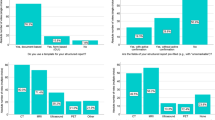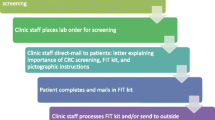Abstract
The purpose of this concept paper is to propose an innovative multifaceted patient navigation module embedded in the Electronic Health Record (EHR) to address barriers to efficient and effective colorectal cancer (CRC) care. The EHR-based CRC patient navigation module will include several patient navigation features: (1) CRC screening registry; (2) patient navigation data, including CRC screening data, outcomes of patient navigation including navigation status (CRC screening referrals, fecal occult blood test (FOBT) completed, colonoscopy scheduled and completed, cancelations, reschedules, and no-shows); (3) CRC counseling aid; and 4) Web-based CRC education application including interactive features such as a standardized colonoscopy preparation guide, modifiable CRC risk factors, and links to existing resources. An essential component of health informatics is the use of EHR systems to not only provide a system for storing and retrieval of patient health data but can also be used to enhance patient decision-making both from a provider and patient perspective.


Similar content being viewed by others
Reference
Texas Department of State Health Services, Texas Cancer Registry. Expected New Cancer Cases and Deaths by Primary Site, Harris County, Texas (2013) Retrieved from http://www.dshs.state.tx.us
Robbins AS, Siegel RL, Jemal A (2012) Racial disparities in stage-specific colorectal cancer mortality rates from 1985 to 2008. J Clin Oncol 30:401–405
U.S. Department of Health and Human Services, Healthy people (2020) objectives. Retrieved from http://healthypeople.gov/2020/topicsobjectives2020/objectives
Advani A, Atkeson B, Brown C, Peterson B, Fish L, Johnson J et al (2003) 2003. Barriers to the participation of African American patients with cancer in clinical trials. Cancer 97(6):1499–1506
Gupta S, Sussman D, Doubeni C, Anderson DS, Day L, Deshpande AR (2014) Challenges and possible solutions to colorectal cancer screening for he underserved. J Natl Cancer Inst 106(4)
Holmes-Rovner M, Williams GA, Hoppough S, Quillan L, Butler R, Given CW (2002) Colorectal cancer screening barriers in persons with low income. Cancer Pract 10(5):240–247
Klabunde CN, Vernon SW, Nadel MR, Breen N, Seeff LC, Brown ML (2005) Barriers to colorectal cancer screening: a comparison of reports from primary care physicians and average-risk adults. Med Care 43(9):939–944
Mandelblatt J, Andrews H, Kao R, Wallace R, Kerner J (1996) The late-stage diagnosis of colorectal cancer: demographic and socioeconomic factors. Am J Public Health 86(12):1794–1797
Goldman SN, Liss DT, Brown T, Lee JY, Buchanan DR, Balsley K et al (2015) Comparative effectiveness of multifaceted outreach to initiate colorectal cancer screening in community health centers: a randomized controlled trial. J Gen Intern Med 30(8):1178–1184
Horne HN, Phelan-EHRick DF, Pollack CE, Markakis D, Wenzel J, Ahmed S et al (2015) Effect of patient navigation on colorectal cancer screening in a community-based randomized controlled trial of urban African American adults. Cancer Causes Control 26(2):239–246
Myers RE, Sifri R, Daskalakis C, DiCarlo M, Geethakumari PR, Cocroft J et al (2014) Increasing colon cancer screening in primary care among African Americans. J Natl Cancer Inst 106(12)
Singal AG, Gupta S, Tiro JA, Skinner CS, McCallister K, Sanders JM et al (2016) Outreach invitations for FIT and colonoscopy improve colorectal cancer screening rates: a randomized controlled trial in a safety-net health system. Cancer 122(3):456–463
Lai E, Calderwood AH, Doros G, Fix O, Jacobson BC (2009) The Boston Bowel Preparation Scale: a valid and reliable instrument for colonoscopy-oriented research. Gastrointest Endosc 69(3):620–625
Lasser KE, Murillo J, Medlin E et al (2009) A multilevel intervention to promote colorectal cancer screening among community health center patients: results of a pilot study. BMC Fam Pract 10(1):1–7
Kim KE (2009) Early detection and prevention of colorectal cancer. SLACK, Inc., Thorofare, NJ
Lyratzopoulos G, Liu MP, Abel GA, Wardle J, Keating NL (2015) The association between fatalistic beliefs and late stage at diagnosis of lung and colorectal cancer. Cancer Epidemiol Biomark Prev 24(4):720–726
Powe BD, Finnie R (2003) Cancer fatalism: the state of the science. Cancer Nurs 26(6):454–467
Lumpkins C, Cupertino P, Young K, Daley C, Yeh H, & Greiner K (2014) Racial/ethnic variations in colorectal cancer screening self-efficacy, fatalism and risk perception in a safety-net clinic population: implications for tailored interventions. Journal of Community Medicine & Health Education. 3
Author information
Authors and Affiliations
Corresponding author
Rights and permissions
About this article
Cite this article
Ajeesh, S., Luis, R. A Comprehensive Electronic Health Record Based Patient Navigation Module Including Technology Driven Colorectal Cancer Outreach and Education. J Canc Educ 33, 627–633 (2018). https://doi.org/10.1007/s13187-017-1184-9
Published:
Issue Date:
DOI: https://doi.org/10.1007/s13187-017-1184-9




